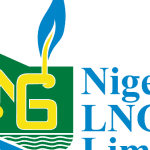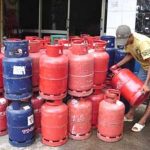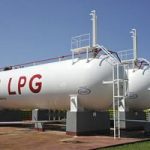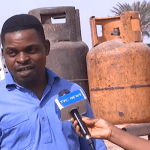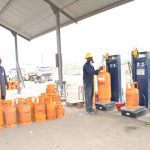Marketers do not have enough infrastructure to take up Nigeria LNG Limited’s Liquefied Petroleum Gas supply, this is according to the company’s management.
In an earlier report, the Independent Petroleum Marketers Association had said that the major cause of the rising cost of cooking gas was lack of adequate supply.
According to the marketers, foreign investors misjudged demand in the Nigerian market, prompting them to import the product.
They advocated that the government should allow NLNG to provide more gas to the market in order to lower costs.
Reports from consumers revealed that the cost of refilling a 12.5-kilogramme cylinder of LPG had risen to as high as N7000 in some states.
The marketers had also urged the government to remove cooking gas from the list of commodities subject to the payment of value added tax.
The marketing manager of NLNG, Austin Ogbogbo, in a response to the claim made by the IPMAN said that the marketers did not have enough infrastructure to take up the gas the company supplied.
He said, “NLNG has grown its capacity from 50,000 metric tonnes per annum to 450,000 metric tonnes per annum of LPG in the past 14 years.
“Nigeria needs 1.2 million metric tonnes per annum, but even the 450,000 we produce cannot be absorbed by the market’s current infrastructure.
“We only operate in the midstream sub sector of the industry so we are only responsible for supplying to the market.
“The downstream players are responsible for the distribution to the end users, and also building the infrastructure to ensure it is done efficiently. It is out of our scope.”
He assured the public that if distributors could accept more LPG, the corporation would expand its capacity.
Marketers do not have enough infrastructure to take up Nigeria LNG Limited’s Liquefied Petroleum Gas supply, this is according to the company’s management.
In an earlier report, the Independent Petroleum Marketers Association had said that the major cause of the rising cost of cooking gas was lack of adequate supply.
According to the marketers, foreign investors misjudged demand in the Nigerian market, prompting them to import the product.
They advocated that the government should allow NLNG to provide more gas to the market in order to lower costs.
Reports from consumers revealed that the cost of refilling a 12.5-kilogramme cylinder of LPG had risen to as high as N7000 in some states.
The marketers had also urged the government to remove cooking gas from the list of commodities subject to the payment of value added tax.
The marketing manager of NLNG, Austin Ogbogbo, in a response to the claim made by the IPMAN said that the marketers did not have enough infrastructure to take up the gas the company supplied.
He said, “NLNG has grown its capacity from 50,000 metric tonnes per annum to 450,000 metric tonnes per annum of LPG in the past 14 years.
“Nigeria needs 1.2 million metric tonnes per annum, but even the 450,000 we produce cannot be absorbed by the market’s current infrastructure.
“We only operate in the midstream sub sector of the industry so we are only responsible for supplying to the market.
“The downstream players are responsible for the distribution to the end users, and also building the infrastructure to ensure it is done efficiently. It is out of our scope.”
He assured the public that if distributors could accept more LPG, the corporation would expand its capacity.
Marketers do not have enough infrastructure to take up Nigeria LNG Limited’s Liquefied Petroleum Gas supply, this is according to the company’s management.
In an earlier report, the Independent Petroleum Marketers Association had said that the major cause of the rising cost of cooking gas was lack of adequate supply.
According to the marketers, foreign investors misjudged demand in the Nigerian market, prompting them to import the product.
They advocated that the government should allow NLNG to provide more gas to the market in order to lower costs.
Reports from consumers revealed that the cost of refilling a 12.5-kilogramme cylinder of LPG had risen to as high as N7000 in some states.
The marketers had also urged the government to remove cooking gas from the list of commodities subject to the payment of value added tax.
The marketing manager of NLNG, Austin Ogbogbo, in a response to the claim made by the IPMAN said that the marketers did not have enough infrastructure to take up the gas the company supplied.
He said, “NLNG has grown its capacity from 50,000 metric tonnes per annum to 450,000 metric tonnes per annum of LPG in the past 14 years.
“Nigeria needs 1.2 million metric tonnes per annum, but even the 450,000 we produce cannot be absorbed by the market’s current infrastructure.
“We only operate in the midstream sub sector of the industry so we are only responsible for supplying to the market.
“The downstream players are responsible for the distribution to the end users, and also building the infrastructure to ensure it is done efficiently. It is out of our scope.”
He assured the public that if distributors could accept more LPG, the corporation would expand its capacity.
Marketers do not have enough infrastructure to take up Nigeria LNG Limited’s Liquefied Petroleum Gas supply, this is according to the company’s management.
In an earlier report, the Independent Petroleum Marketers Association had said that the major cause of the rising cost of cooking gas was lack of adequate supply.
According to the marketers, foreign investors misjudged demand in the Nigerian market, prompting them to import the product.
They advocated that the government should allow NLNG to provide more gas to the market in order to lower costs.
Reports from consumers revealed that the cost of refilling a 12.5-kilogramme cylinder of LPG had risen to as high as N7000 in some states.
The marketers had also urged the government to remove cooking gas from the list of commodities subject to the payment of value added tax.
The marketing manager of NLNG, Austin Ogbogbo, in a response to the claim made by the IPMAN said that the marketers did not have enough infrastructure to take up the gas the company supplied.
He said, “NLNG has grown its capacity from 50,000 metric tonnes per annum to 450,000 metric tonnes per annum of LPG in the past 14 years.
“Nigeria needs 1.2 million metric tonnes per annum, but even the 450,000 we produce cannot be absorbed by the market’s current infrastructure.
“We only operate in the midstream sub sector of the industry so we are only responsible for supplying to the market.
“The downstream players are responsible for the distribution to the end users, and also building the infrastructure to ensure it is done efficiently. It is out of our scope.”
He assured the public that if distributors could accept more LPG, the corporation would expand its capacity.
Marketers do not have enough infrastructure to take up Nigeria LNG Limited’s Liquefied Petroleum Gas supply, this is according to the company’s management.
In an earlier report, the Independent Petroleum Marketers Association had said that the major cause of the rising cost of cooking gas was lack of adequate supply.
According to the marketers, foreign investors misjudged demand in the Nigerian market, prompting them to import the product.
They advocated that the government should allow NLNG to provide more gas to the market in order to lower costs.
Reports from consumers revealed that the cost of refilling a 12.5-kilogramme cylinder of LPG had risen to as high as N7000 in some states.
The marketers had also urged the government to remove cooking gas from the list of commodities subject to the payment of value added tax.
The marketing manager of NLNG, Austin Ogbogbo, in a response to the claim made by the IPMAN said that the marketers did not have enough infrastructure to take up the gas the company supplied.
He said, “NLNG has grown its capacity from 50,000 metric tonnes per annum to 450,000 metric tonnes per annum of LPG in the past 14 years.
“Nigeria needs 1.2 million metric tonnes per annum, but even the 450,000 we produce cannot be absorbed by the market’s current infrastructure.
“We only operate in the midstream sub sector of the industry so we are only responsible for supplying to the market.
“The downstream players are responsible for the distribution to the end users, and also building the infrastructure to ensure it is done efficiently. It is out of our scope.”
He assured the public that if distributors could accept more LPG, the corporation would expand its capacity.
Marketers do not have enough infrastructure to take up Nigeria LNG Limited’s Liquefied Petroleum Gas supply, this is according to the company’s management.
In an earlier report, the Independent Petroleum Marketers Association had said that the major cause of the rising cost of cooking gas was lack of adequate supply.
According to the marketers, foreign investors misjudged demand in the Nigerian market, prompting them to import the product.
They advocated that the government should allow NLNG to provide more gas to the market in order to lower costs.
Reports from consumers revealed that the cost of refilling a 12.5-kilogramme cylinder of LPG had risen to as high as N7000 in some states.
The marketers had also urged the government to remove cooking gas from the list of commodities subject to the payment of value added tax.
The marketing manager of NLNG, Austin Ogbogbo, in a response to the claim made by the IPMAN said that the marketers did not have enough infrastructure to take up the gas the company supplied.
He said, “NLNG has grown its capacity from 50,000 metric tonnes per annum to 450,000 metric tonnes per annum of LPG in the past 14 years.
“Nigeria needs 1.2 million metric tonnes per annum, but even the 450,000 we produce cannot be absorbed by the market’s current infrastructure.
“We only operate in the midstream sub sector of the industry so we are only responsible for supplying to the market.
“The downstream players are responsible for the distribution to the end users, and also building the infrastructure to ensure it is done efficiently. It is out of our scope.”
He assured the public that if distributors could accept more LPG, the corporation would expand its capacity.
Marketers do not have enough infrastructure to take up Nigeria LNG Limited’s Liquefied Petroleum Gas supply, this is according to the company’s management.
In an earlier report, the Independent Petroleum Marketers Association had said that the major cause of the rising cost of cooking gas was lack of adequate supply.
According to the marketers, foreign investors misjudged demand in the Nigerian market, prompting them to import the product.
They advocated that the government should allow NLNG to provide more gas to the market in order to lower costs.
Reports from consumers revealed that the cost of refilling a 12.5-kilogramme cylinder of LPG had risen to as high as N7000 in some states.
The marketers had also urged the government to remove cooking gas from the list of commodities subject to the payment of value added tax.
The marketing manager of NLNG, Austin Ogbogbo, in a response to the claim made by the IPMAN said that the marketers did not have enough infrastructure to take up the gas the company supplied.
He said, “NLNG has grown its capacity from 50,000 metric tonnes per annum to 450,000 metric tonnes per annum of LPG in the past 14 years.
“Nigeria needs 1.2 million metric tonnes per annum, but even the 450,000 we produce cannot be absorbed by the market’s current infrastructure.
“We only operate in the midstream sub sector of the industry so we are only responsible for supplying to the market.
“The downstream players are responsible for the distribution to the end users, and also building the infrastructure to ensure it is done efficiently. It is out of our scope.”
He assured the public that if distributors could accept more LPG, the corporation would expand its capacity.
Marketers do not have enough infrastructure to take up Nigeria LNG Limited’s Liquefied Petroleum Gas supply, this is according to the company’s management.
In an earlier report, the Independent Petroleum Marketers Association had said that the major cause of the rising cost of cooking gas was lack of adequate supply.
According to the marketers, foreign investors misjudged demand in the Nigerian market, prompting them to import the product.
They advocated that the government should allow NLNG to provide more gas to the market in order to lower costs.
Reports from consumers revealed that the cost of refilling a 12.5-kilogramme cylinder of LPG had risen to as high as N7000 in some states.
The marketers had also urged the government to remove cooking gas from the list of commodities subject to the payment of value added tax.
The marketing manager of NLNG, Austin Ogbogbo, in a response to the claim made by the IPMAN said that the marketers did not have enough infrastructure to take up the gas the company supplied.
He said, “NLNG has grown its capacity from 50,000 metric tonnes per annum to 450,000 metric tonnes per annum of LPG in the past 14 years.
“Nigeria needs 1.2 million metric tonnes per annum, but even the 450,000 we produce cannot be absorbed by the market’s current infrastructure.
“We only operate in the midstream sub sector of the industry so we are only responsible for supplying to the market.
“The downstream players are responsible for the distribution to the end users, and also building the infrastructure to ensure it is done efficiently. It is out of our scope.”
He assured the public that if distributors could accept more LPG, the corporation would expand its capacity.




